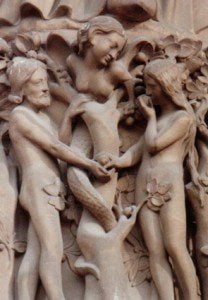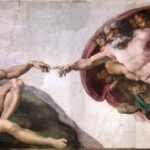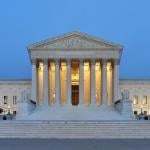 The fourth chapter of Peter Bouteneff’s book Beginnings: Ancient Christian Readings of the Biblical Creation Narratives looks at the role the creation narrative plays in the existing works of two somewhat controversial early Christian thinkers and writers – Tertullian (around 200; ca. 160 – ca. 225) and Origen (ca.185-254). Tertullian is sketched briefly, and Origen considered in significantly more detail.
The fourth chapter of Peter Bouteneff’s book Beginnings: Ancient Christian Readings of the Biblical Creation Narratives looks at the role the creation narrative plays in the existing works of two somewhat controversial early Christian thinkers and writers – Tertullian (around 200; ca. 160 – ca. 225) and Origen (ca.185-254). Tertullian is sketched briefly, and Origen considered in significantly more detail.
The purpose of scripture, the Christ-centeredness of the narrative, and the importance of story are significant running themes. The role of story is especially important to Origen.
Could parts of scripture – including the creation narratives – be designed as stories with the intention of inviting readers into deep engagement?
Tertullian, from Carthage in North Africa, was the first early Church father to write in Latin. Bouteneff summarizes his use of the creation narrative in his surviving works, but doesn’t spend much time looking at Tertullian’s body of work in any depth. Tertullian read scripture in a Christ-centered fashion through the rule of faith. This rule, outlined in The Prescription Against Heretics Ch. 13 is an early sketch of the ideas we find in the Apostle’s and then the Nicene creeds. This is relevant to the discussion of origins because it begins with God and creation, and places Christ as central in the creation process.
Now, with regard to this rule of faith … that which prescribes the belief that there is one only God, and that He is none other than the Creator of the world, who produced all things out of nothing through His own Word, first of all sent forth; that this Word is called His Son (Ante-Nicene Fathers Vol. 3, p. 249)
Scripture, for Tertullian, was not a linear record as much as a revelation of the Christ-centered rule of faith. Tertullian uses Genesis 1 to argue for creation out of nothing. He used Genesis 1-3 in his argument against Marcion to show that the God of the Old Testament was not a monster. Tertullian viewed the narrative as historical but also as story centered in Christ. Adam disobeyed God, but admitted his guilt. God did not search for Adam out of ignorance, but to give him a chance to confess (Against Marcion, 2.25 Ante-Nicene Fathers Vol 3, p. 316–317). He saw Adam and Eve as candidates for restoration because they had been relieved by confession.
God put the question with an appearance of uncertainty, in order that even here He might prove man to be the subject of a free will in the alternative of either a denial or a confession, and give to him the opportunity of freely acknowledging his transgression, and, so far,of lightening it. (Ante-Nicene Fathers Vol 3, p. 317)
Tertullian seeks to demonstrate that God is good. Sin, death, and liability to judgement are the responsibility of the creature not of the Creator. Humans are made in the image of Christ – and in the process of creation God had in mind Christ who would likewise become flesh and earth. (On the Resurrection of the Flesh Ante-Nicene Fathers Vol 3, p. 549).
Origen was a prolific Christian writer, thinker, and scholar. He is purported to have written some 2000-6000 works (depending how one counts) from commentaries on Genesis and John to his well known texts On First Principles and Against Celsus. His Hexapla, written while he was in Caesarea Maritima, contained a comparison of six versions of the Old Testament. (The picture at the top of this post is of an excavation of Caesarea next to the area of the Crusader fortress.)
Most of Origen’s work is lost, and with much which has survived the mode of transmission is something of the problem. Some of Origen’s ideas (such as reincarnation) were controversial and he was later found to be heretical. The decree of heresy was not and is not universally affirmed. But because of this controversy many of his works were destroyed or simply not preserved. Those that were preserved and transmitted may have been altered by supporters or by detractors. This is especially true of his text On First Principles. This must be kept in mind as his work is studied. But for all of his flights of fancy and emphasis on allegory, Origen was yet another early church father anchored in a Christ-centered view of creation and view of scripture. This is apparent from beginning to end.
Even the first words of the Bible “In the beginning,” to him signify not a temporal or chronological beginning but Christ, who is “the beginning.” He opens his Genesis homolies by quoting Genesis 1:1 and asking “What is ‘the beginning’ of all things except our Lord and Savior of all, Jesus Christ, the first-born of every creature? … all things which were made were made ‘in the beginning’ that is in the Savior. (p. 115)
Origin thought deeply on the nature of scripture and the interpretation of scripture – his thoughts are worth considering. We often suppose that it is only in the modern, scientific age that the nature of scripture and the nature of the creation narratives have been questioned. This is clearly not the case however. Origen defended the inspiration of scripture and he thought the earth was young and used the age of the earth as a part of his argument in Against Celsus. Yet this still did not lead to a literal interpretation of the creation narratives. Consider this passage from On First Principles Book 4 as translated from the Greek.
For who that has understanding will suppose that the first, and second, and third day, and the evening and the morning, existed without a sun, and moon, and stars? and that the first day was, as it were, also without a sky? And who is so foolish as to suppose that God, after the manner of a husbandman, planted a paradise in Eden, towards the east, and placed in it a tree of life, visible and palpable, so that one tasting of the fruit by the bodily teeth obtained life? and again, that one was a partaker of good and evil by masticating what was taken from the tree? And if God is said to walk in the paradise in the evening, and Adam to hide himself under a tree, I do not suppose that anyone doubts that these things figuratively indicate certain mysteries, the history having taken place in appearance, and not literally. (Ante-Nicene Fathers Vol. 4, p. 365)
But did Origen consider Adam and Eve as literal historical figures and the fall as a historical event? Bouteneff works through Origen’s writings and summarizes as follows:
First: There were no witnesses to convey many of the stories in Genesis 1-11, thus Origen concluded that the Holy Spirit dictated the scripture to Moses to the very last letter, but his understanding of the process and result was more nuanced than many of our arguments today. The Scriptures were inspired, but were intentionally not literal. The modern definition of literal inerrancy would have made no sense to Origen. Bouteneff summarizes Origen’s nuanced view as follows: “Yet the Holy Spirit dictated not history but stories that contained complexities and difficulties, with the intention of inviting readers into the deepest and most serious engagement.” (p.118)
Second: Even in Origen’s time Christians were faced with a choice – suspend belief in the “science” of their day or suspend belief in a literal or scientific interpretation of the creation narratives. This isn’t a new problem – although some of the questions are certainly new.
Third: The Fall. Bouteneff finds Origen somewhat inconsistent in his discussion of Adam, a position I share from my much more limited reading. He probably thought of Adam and Eve as actual persons when he considered the genealogies, but he did not follow through on this consistently. On the other hand, “[Origen] had a strong sense of human fallenness, which he attributed sometimes to the Adamic transgression and sometimes to God’s pre-existing ideas for humanity.” (p. 119) In fact Bouteneff suggests that “Pelagius’s teaching on the self-sufficient goodness of human nature was part of an anti-Origenist wave,” while Augustine retained Origen’s sense of fallenness but placed the burden solely on Adam. Here we have the beginning of something that may be considered original sin – not as contagion, but as an intrinsic and inescapable falleness of all of humanity.
This is fascinating. Through story we are led to wrestle with truth in profound ways – in ways more powerful than a prosaic recitation of fact.
What do you think of Origen’s view of parts of scripture – including the creation narratives – as stories with the intention of inviting readers into deep engagement?
Must human fallenness be connected to a unique historical act?
If you wish to contact me directly you may do so at rjs4mail [at] att.net.
If interested you can subscribe to a full text feed of my posts at Musings on Science and Theology.











